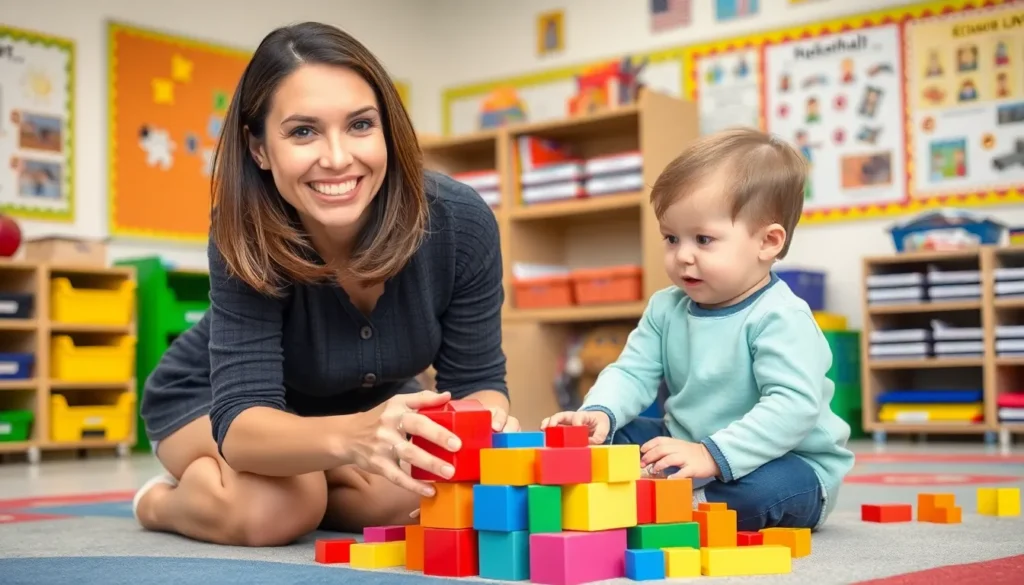Table of Contents
ToggleIn a world where every child deserves a chance to shine, early childhood special education master’s programs are the superheroes in training. These programs equip educators with the tools to support young learners with diverse needs, turning potential challenges into incredible success stories. Imagine being the one who helps a child discover their voice or navigate their world with confidence. Sounds rewarding, right?
But let’s face it—choosing the right program can feel like finding a needle in a haystack. With so many options out there, it’s easy to get lost in the details. Fear not! This guide will help navigate the ins and outs of these programs, ensuring aspiring educators find their perfect fit while keeping the humor alive. After all, who says education can’t be fun?
Overview of Early Childhood Special Education Masters Programs
Early childhood special education master’s programs equip educators with vital skills to support young children with diverse needs. Programs emphasize evidence-based practices that foster inclusive learning environments. Many institutions offer specialized curricula focused on developmental delays, learning disabilities, and behavioral challenges.
Students engage in a combination of theoretical coursework and practical experiences. These experiences typically include internships, student teaching, and hands-on learning opportunities in real-world settings. Faculty members often bring considerable experience and expertise in early childhood education, ensuring high-quality instruction and mentorship.
Courses cover various critical topics. These may include assessment techniques, intervention strategies, and family dynamics. Understanding the role of family involvement in education forms a core aspect of many programs. Additionally, training in supportive technologies plays a significant role in modern education.
Graduates from these programs often work in diverse settings, such as public schools, private institutions, and early intervention agencies. Career paths for graduates typically include roles as special education teachers, early intervention specialists, and program coordinators. Job opportunities remain abundant due to increasing awareness of special education needs.
Accredited programs generally maintain high academic standards, ensuring their alignment with state and national regulations. Several universities offer both online and on-campus options, providing flexibility for working professionals. Aspiring educators can choose a program that best fits their schedule and learning preferences, enhancing accessibility to advanced education.
Importance of Early Childhood Special Education

Early childhood special education plays a vital role in shaping the development of young learners with special needs. Programs focus on providing tailored educational experiences that support growth and learning.
Benefits for Students with Special Needs
Students with special needs thrive in environments where educators utilize evidence-based practices. These programs enhance academic skills, social interactions, and emotional development. Interventions directly address individual challenges, promoting independence and confidence. Developmentally appropriate strategies educate children alongside peers, fostering inclusion. Access to specialized support results in significant progress, enabling students to achieve educational milestones. Enhanced communication skills arise from targeted teaching methods, equipping them for future academic pursuits.
Impact on Families and Communities
Families experience profound benefits from early childhood special education programs. Support for children enhances familial bonding and decreases stress levels related to educational challenges. Parents become active partners in their children’s learning, fostering a collaborative spirit. Community understanding of special education needs increases, creating a more inclusive environment for all. Stronger advocacy for resources and support emerges, benefitting families and empowering their voices. Ultimately, success in education translates into community growth and improved quality of life.
Types of Masters Programs Available
Early childhood special education master’s programs offer various formats to suit different needs. Understanding these options helps prospective students make informed decisions.
Online vs. On-Campus Programs
Online programs provide flexibility for working professionals while maintaining rigorous academic standards. Students can engage with diverse coursework remotely, allowing for a balance between personal and professional commitments. On-campus programs enable face-to-face interactions with faculty and peers, fostering community and collaboration. Many institutions offer a combination of both formats, accommodating different learning styles and schedules. Those who prioritize networking opportunities and hands-on learning might prefer on-campus settings. Ultimately, choosing between online and on-campus depends on each individual’s lifestyle and goals.
Full-Time vs. Part-Time Enrollment Options
Full-time enrollment allows students to complete their degree quickly, often in as few as two years. Immersed in coursework, students gain extensive knowledge and practical experience in a shorter timeframe. Part-time options are ideal for those balancing work or family responsibilities. These programs typically extend duration, providing a more manageable pace. Many institutions offer evening or weekend classes, making it easier for working professionals to engage. Deciding between full-time and part-time enrollment involves considering personal commitments and career aspirations.
Curriculum and Course Structure
Early childhood special education master’s programs feature a comprehensive curriculum designed to equip educators with essential skills. These programs include core courses that address fundamental aspects of special education, providing a solid foundation for students.
Core Courses
Core courses provide foundational knowledge crucial for working with young learners who have special needs. Such courses often include topics like developmental psychology, educational assessment, and intervention methods. Students gain insights into effective teaching strategies that cater to diverse learning styles. Skills developed in these classes prepare educators to create inclusive classrooms where all students thrive. Faculty with extensive experience lead these courses, ensuring a blend of theory and practical application.
Elective Courses and Specializations
Elective courses allow students to tailor their education according to specific interests and career goals. Options commonly include behavior management, speech and language development, and autism spectrum disorders. Each specialization enhances understanding of unique challenges faced by children with disabilities. Through these electives, students explore innovative approaches to intervention and support. Faculty collaboration enriches learning experiences, enabling educators to become experts in their chosen areas. Overall, these electives deepen the educational journey, fostering well-rounded professionals in the field.
Career Opportunities After Graduation
Graduates of early childhood special education master’s programs enjoy a wealth of career opportunities. They often find themselves in rewarding positions within various settings that support young learners with diverse needs.
Potential Job Roles
Special education teachers play a crucial role in the classroom, directly aiding children with disabilities in their academic and social development. Early intervention specialists assess children’s needs and implement targeted strategies to foster growth. Program coordinators oversee special education programs, ensuring proper resources and compliance with regulations. Additionally, family support advocates facilitate communication between schools and families, promoting collaboration and understanding. Opportunities also exist in research and policy development, where professionals influence special education practices and advocate for systemic change.
Salary Expectations
Salaries for roles in early childhood special education vary significantly based on position, experience, and location. Special education teachers typically earn between $40,000 and $70,000 annually, with averages roughly around $60,000. Early intervention specialists can expect salaries ranging from $45,000 to $75,000, depending on qualifications and the specific job market. Program coordinators often earn higher salaries, averaging between $55,000 and $85,000. Factors such as advanced degrees and certifications can further enhance earning potential and lead to professional advancement opportunities.
Pursuing a master’s degree in early childhood special education opens doors to a fulfilling career dedicated to supporting young learners with diverse needs. Educators equipped with the right skills and knowledge can make a significant impact on children’s lives, fostering their growth and development.
With various program formats available, aspiring educators can choose options that best fit their lifestyles and career aspirations. The emphasis on evidence-based practices ensures that graduates are well-prepared to create inclusive learning environments.
As awareness of special education needs continues to grow, the demand for qualified professionals remains strong. This field not only offers rewarding career opportunities but also contributes positively to families and communities, making it a vital area of education.







